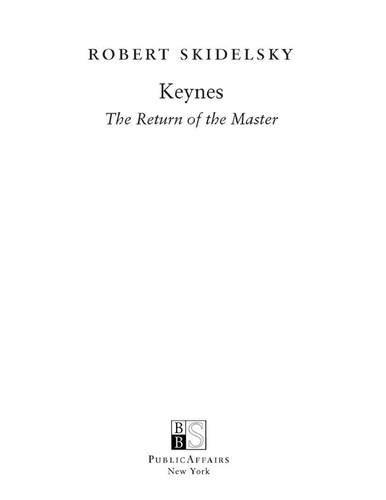[electronic resource] :, 228 pages
English language
Published Nov. 4, 2010 by PublicAffairs.

[electronic resource] :, 228 pages
English language
Published Nov. 4, 2010 by PublicAffairs.
The ideas of John Maynard Keynes have never been more timely. No one has bettered Keynes's description of the psychology of investors during a financial crisis: ‘The practice of calmness and immobility, of certainty and security, suddenly breaks down. New fears and hopes will, without warning, take charge of human conduct… the market will be subject to waves of optimistic and pessimistic sentiment.' Keynes's preeminent biographer, Robert Skidelsky, Emeritus Professor of Political Economy at the University of Warwick, brilliantly synthesizes from Keynes's career and life the aspects of his thinking that apply most directly to the world we currently live in. In so doing, Skidelsky shows that Keynes's mixture of pragmatism and realism – which distinguished his thinking from the neo-classical or Chicago school of economics that has been the dominant influence since the Thatcher-Reagan era and which made possible the raw market capitalism that created the current global financial …
The ideas of John Maynard Keynes have never been more timely. No one has bettered Keynes's description of the psychology of investors during a financial crisis: ‘The practice of calmness and immobility, of certainty and security, suddenly breaks down. New fears and hopes will, without warning, take charge of human conduct… the market will be subject to waves of optimistic and pessimistic sentiment.' Keynes's preeminent biographer, Robert Skidelsky, Emeritus Professor of Political Economy at the University of Warwick, brilliantly synthesizes from Keynes's career and life the aspects of his thinking that apply most directly to the world we currently live in. In so doing, Skidelsky shows that Keynes's mixture of pragmatism and realism – which distinguished his thinking from the neo-classical or Chicago school of economics that has been the dominant influence since the Thatcher-Reagan era and which made possible the raw market capitalism that created the current global financial crisis – is more pertinent and applicable than ever. Crucially Keynes offers nervous capitalists – and Keynes never wavered in his belief in the capitalist system – a positive answer to the question we now face: When unbridled capitalism falters, is there an alternative? "In the long run," as Keynes famously said, "we are all dead". We may not have time to wait for the perfect theoretical operation of capital as the neo-classicists insist will happen eventually. In the meantime, we have Keynes: more supple, more human and more magnificently real than ever.